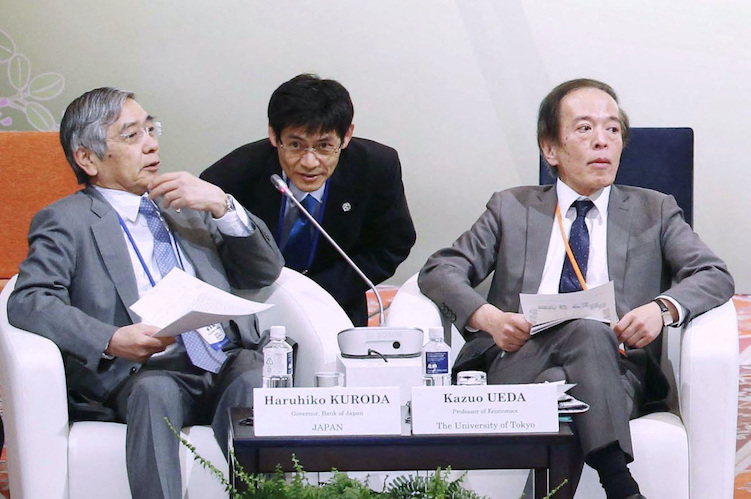The yen shot up on Friday following reports that the Japanese government was set to appoint Kazuo Ueda as the central bank’s next governor.
The surprise news, confirmed by two government officials, has increased speculation that the Bank of Japan (BOJ) could phase out super-low interest rates sooner than expected.
Ueda, a former member of the BOJ’s policy board and an academic at Kyoritsu Women’s University, is considered an expert on monetary policy and played a key role in battling the initial phase of Japan’s deflation with the introduction of huge amounts of asset purchases and forward guidance for financial markets.
But most analysts said the appointment of the 71-year-old was totally unexpected – he was not even considered a dark horse candidate – and it was hard to tell immediately what that meant for any changes in the bank’s near-term monetary policy.
Investors have repeatedly tried to push up Japanese government bond yields in recent months on expectations the BOJ will start to phase out its massive stimulus programme when a new governor takes over after Haruhiko Kuroda’s second term ends in April.
While other central banks around the world have been scrambling to cool stubbornly high inflation by ramping up interest rates, the BOJ has been in no rush to change its super-loose policy stance, even as years of heavy bond buying increasingly distort the country’s bond markets.
While Japanese inflation hit 4% in December, double the BOJ’s 2% target, Kuroda has argued it is too early to tell if price rises will be sustainable.
The government will also nominate Ryozo Himino, former head of Japan’s banking watchdog, and BOJ executive Shinichi Uchida as deputy governors, the two officials with knowledge of the matter said, speaking on condition of anonymity as they were not authorised to speak publicly.
ALSO SEE:
Japan Warns of Tight Finances as BOJ Battles to Contain Yields
Former BoJ board member
“Ueda is well-versed in interest rates. And he also has an experience of the communication struggle over the BOJ’s zero-interest rate policy when he was a board member,” said Shotaro Kugo, an economist at Daiwa Institute of Research.
“Being a theorist and practitioner at the same time would make him well positioned going forward as the BOJ enters a difficult period of (policy) normalisation.”
“None of the three governor/deputy governors appear to have the (dovish) reflationist idea. I can see the government’s intention to renew the monetary policy direction from the previous one.”
The BOJ shocked markets in December when it raised the cap on the 10-year yield to 0.5% from 0.25%, doubling the band it would permit above or below its target of zero.
The yen gained across the board, as analysts expect the new governor could bring an end to the BOJ’s ultra-easy monetary policy sooner than previously thought.
‘Hawkish’ outcome
James Malcolm, head of FX strategy at UBS, said Ueda’s nomination should be perceived as a “hawkish” outcome, given Ueda’s previous criticism of the BOJ’s monetary policy as far back as 2016.
“I’m surprised that dollar-yen is not at 129 already,” Malcolm said. “Maybe that’s just a result of people not knowing who these characters are. To me, this is as hawkish an outcome as having Mr Yamaguchi in the governor role.”
Hirohide Yamaguchi, a former BOJ deputy governor, was also in the running for the top job and has previously been a vocal critic of the BOJ’s stimulus programme.
The dollar sunk as much as 1.2% to 129.8 yen. It was last down 0.9% to 130.365 yen.
The euro and sterling both fell 0.9% to 140.01 yen and 158.16 yen, respectively. The Australian dollar slipped 0.7%.
“Markets had been expecting Amamiya to come in and pick-up where Kuroda left off,” Simon Harvey, head of FX analysis at Monex Europe, said.
“The BOJ’s exit from ultra-easy monetary policy is still highly dependent on what happens during the spring wage negotiations, but a new regime could mean there’s no love lost on the ultra-loose policy side.”
The government is expected to present the nominees to parliament on Tuesday February 14.
Dollar index down
The dollar index, which measures it against six currencies including the yen, was last down 0.2% to 103.01. For the week, the index is set to eke out a 0.06% gain, its second straight positive week and a run it has not had since October.
The pound was up 0.1% at $1.2134 after Britain managed to avoid a technical recession, with the economy showing zero growth in the final three months of 2022.
The euro was little changed at $1.074 and was set for a second straight week of losses.
Elsewhere, the Australian dollar rose 0.1% to $0.6946, while the kiwi rose 0.2% against the U.S. dollar at $0.6338.
- Reuters with additional editing by Jim Pollard
NOTE: The headline on this report was amended on February 10, 2023.
ALSO SEE:
Japan Eyeing Amamiya as Next BOJ Governor, Nikkei Says
BOJ Urged by IMF to Loosen Reins on Long-Term Yields
Japan Warns of Tight Finances as BOJ Battles to Contain Yields
Investors Shift Focus to Yen After BOJ Defies Expectations
























